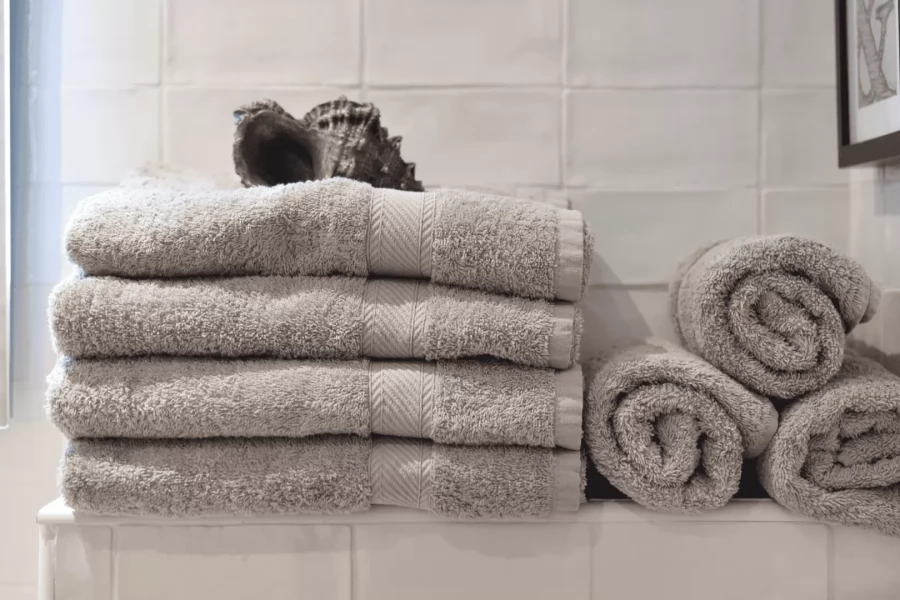7 Essential Washing Rules to Make Towels Last Longer
Learn how to extend the lifespan of your towels with the right washing, detergents, drying and storage tips. Practical advice from Selin Textile.
Havlular, günlük hayatta en sık kullanılan tekstil ürünleri arasındadır. Yumuşaklıklarını, emiciliklerini ve hijyenlerini korumak için doğru yıkama alışkanlıkları şarttır. Havlular sıklıkla nem ve ciltle temas ettiğinden, uygunsuz bakım bakteri üremesine ve doku kaybına yol açabilir. Bu nedenle, hem ürünün kalitesi hem de kullanıcı alışkanlıkları uzun süreli kullanım için kritik öneme sahiptir.
Doğru su sıcaklığı, uygun deterjan kullanımı ve doğru kurutma yöntemleri, havlunun ömrünü önemli ölçüde uzatabilir. Ayrıca, saklama ve yıkama sıklığı gibi faktörler de dikkate alınmalıdır. Kaliteli bir havlu, doğru bakımla yıllarca dayanabilirken, yanlış yıkama uygulamaları birkaç ay içinde gözle görülür aşınmaya neden olabilir.
Bu içerikte, havluların daha uzun süre dayanmasını sağlayan yedi temel kuralı inceleyeceğiz. Yaygın hatalardan kaçınmak hem hijyenik hem de ekonomik faydalar sağlar.
Havluların Yıkama Sıklığı ve Zamanlaması Neden Önemlidir?
Havlular sıklıkla nem emdikleri için kısa sürede bakteri üreme alanı haline gelirler. Özellikle duştan sonra kullanılan banyo havluları ter ve cilt kalıntılarıyla kirlenir. Hijyen açısından haftada en az iki kez yıkanmaları önerilir.
Düzenli olarak yıkanmayan havlular nemi hapsederek küf ve bakteri oluşumuna yol açabilir. Bu durum sadece havluların ömrünü kısaltmakla kalmaz, aynı zamanda özellikle hassas cilde sahip kişiler için cilt sağlığı açısından da risk oluşturur.
Regular washing enhances comfort and helps maintain the towel’s original structure. Otherwise, fibers may get damaged, and absorbency will decrease. Hence, washing frequency should be aligned with the frequency of use.
How Does Washing Temperature Affect the Lifespan of a Towel?
Washing at high temperatures can help eliminate bacteria but may damage towel fibers. A temperature range of 40-60°C is ideal for maintaining hygiene while preserving fabric durability. Excessively hot water, such as 90°C, may cause permanent deformation in cotton towels.
Washing in cold water saves energy but may not ensure proper cleanliness. Thus, finding the ideal temperature balance is crucial. Lower temperatures are suitable for colored towels, while white towels can occasionally be washed hotter for disinfection.
Proper temperature preserves color and fabric structure without compromising cleanliness. Always follow the care label instructions for the best results.
Why Is Proper Detergent Choice and Dosage Critical?
One of the most common mistakes in towel care is using too much detergent. Excess detergent leaves residue on fibers, making towels stiff and less absorbent over time.
Similarly, using fabric softener frequently is not recommended. It leaves a coating on towel fibers, which reduces their ability to absorb moisture. Softener use should be limited, especially for baby or face towels.
Detergents free from phosphates and harsh chemicals are ideal for towels. Hypoallergenic options are best for sensitive users. Always follow the dosage instructions provided on the detergent label.
Should Towels Be Separated Before Washing?
Separating towels by color is essential for long-term use and aesthetics. Washing colored and white towels together may cause color bleeding. Also, different fabric types may damage one another.
Avoid washing towels with other garments. Zippers or buttons on clothes can harm towel fibers. Moreover, mixed laundry loads may affect towel hygiene and increase wear.
For best results, wash towels separately with similar fabrics. This not only improves cleaning efficiency but also preserves softness and absorbency.
How Does the Drying Process Affect Towel Quality?
Just like washing, the drying process plays a major role in towel longevity. High heat in tumble dryers can damage towel fibers, causing stiffness and loss of absorbency.
Natural air-drying is a healthier alternative. Towels dried in a well-ventilated area out of direct sunlight retain their form and hygiene for longer. Avoid extreme weather conditions during drying.
Towels should be spread flat while drying. Folding them while wet may leave moisture in certain areas, encouraging bacterial growth. Careful drying ensures freshness and softness.
What Are the Proper Storage Conditions for Towels?
To extend the lifespan of towels, proper storage is as important as washing. Here are the basics:
-
Dry Environment: Never store towels in damp areas.
-
Havalandırma: Küf oluşumunu önlemek için depolama alanlarını sık sık havalandırın.
-
Katlama Yöntemi: Havlular çok sıkı bastırılmadan düzgün bir şekilde katlanmalıdır.
-
Doğal Koku: Kimyasal naftalinlerden kaçının; lavanta keseleri gibi doğal kokular kullanın.
-
Temiz Depolama: Depolama raflarını düzenli olarak temizleyin ve kuru kalmalarını sağlayın.
Bu kurallara uymak, havlu kalitenizin ve hijyeninizin uzun vadede korunmasına yardımcı olur.
Selin Tekstil Havlu Ürünlerinde Yıkama Dayanıklılığı
Selin Tekstil, ürettiği her havluda uzun ömürlü kullanım ve dayanıklılığı ön planda tutar. Yüksek kaliteli iplik ve dokuma teknikleri, tekrarlanan yıkamalardan sonra bile deformasyonu en aza indirerek hem ev hem de ticari kullanım için idealdir.
Selin Tekstil havluları, defalarca yıkamadan sonra bile şeklini, rengini ve yumuşaklığını korur. Yüksek emiciliği ve uzun süreli konforuyla her kullanımda kullanıcı memnuniyetini artırır.
Sürdürülebilir üretim uygulamalarıyla Selin Tekstil, çevreye duyarlı ve yüksek performanslı havlu çözümleri sunuyor. İster otel, ister spa veya kişisel kullanım için olsun, her türlü ihtiyaca dayanıklı ve şık seçeneklerle cevap veren Selin Tekstil, havluları kalıcı bir yatırıma dönüştürüyor.
Sıkça Sorulan Sorular
Havluları yıkamak için ideal sıcaklık kaç derecedir?
Genellikle 40-60°C arasındadır. Çok sıcak su liflere zarar verebilir.
Yumuşatıcı kullanılmalı mı?
Az miktarda kullanın. Aşırı kullanım emiciliği azaltır.
Havlular ne sıklıkla yıkanmalıdır?
Hijyen açısından haftada en az iki kez yapılması önerilir.
Hava ile kurutma mı yoksa makine ile kurutma mı daha iyidir?
Hava ile kurutma havlunun ömrünü uzatır.
